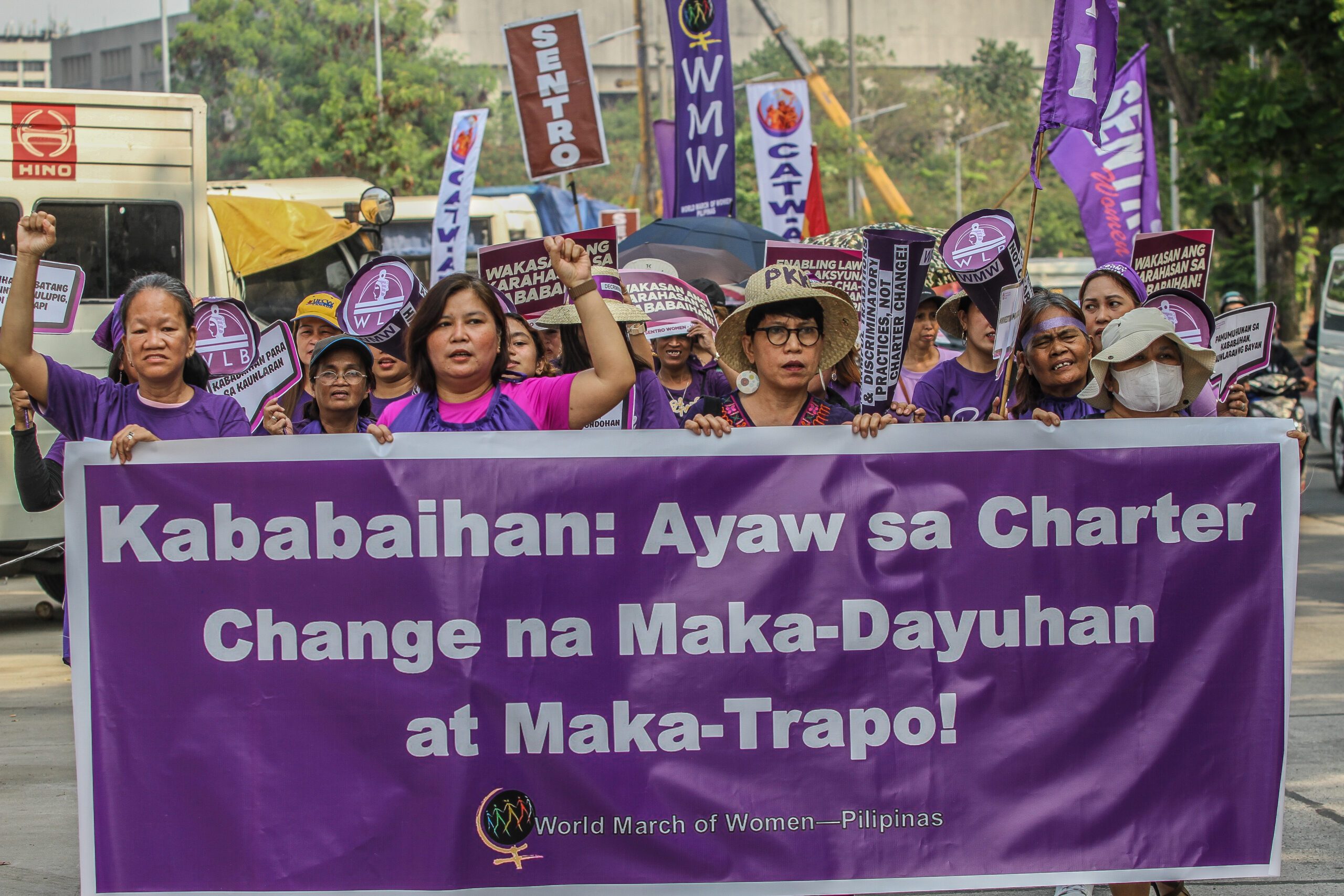In this year’s International Women’s Day celebration, Philippine progressive women’s groups put a spotlight on charter change as a national issue which will adversely impact the Filipino women.
Drumbeating the call “Kababaihan: Ayaw sa Charter Change na Maka-Dayuhan at Maka-Trapo” (Women Reject Pro-foreigner and Pro-traditional politician Charter Change), over three hundred (300) women clad in purple under the umbrella organization World March of Women-Pilipinas, marched to and assembled on the grounds of the Philippine Senate, March 7.
At the Senate, through the power of their poetry and dance performances, these groups—Partido Manggagawa, SENTRO Women, Pambansang Koalisyon ng mga Kababaihan sa Kanayunan (PKKK or National Coalition of Rural Women), Coalition Against Trafficking of Women-Asia Pacific (CATW-AP), Bagong Kamalayan Prostitution Survivors Collective, Center for Migrant Advocacy (CMA), Foundation for Media Alternatives (FMA), Women’s Legal and Human Rights Bureau (WLB) and WomanHealthPhilippines—called on the attention of the lawmakers to stop all efforts to change the 1987 Constitution.
Jean Enriquez, coordinator of WMW-Pilipinas and Executive Director of CATW-AP, stated that “The Filipino women need safety from patriarchal violence, protection from foreign ownership of our natural resources, foreign military basing and foreign control of food production and public services, even as these are happening now.” “All of these would worsen when the constitutional barriers to full foreign ownership of resources and public services are removed, as well as provisions on freedom from nuclear weapons and foreign military basing,” said Enriquez during the program in front of the Senate building.
“Violence against women and prostitution have been proven to increase with foreign military bases,”added Enriquez.
“We have struggled and won against nuclear and military build-up. We have been fighting for food sovereignty and freedom from patriarchal violence. All these struggles will be pushed back when we open our Charter at these intense periods of inequalities and at the height of opportunism by our historically abusive politicians,” Enriquez stressed.
The labor sector would be most affected, too. According to Joanna Bernice Coronacion of Sentro ng Nagkakaisa at Progresibong Manggagawa (SENTRO) Women, “Women’s social liberation—full equality in the law, workplace, community, and home—is a continuous struggle. Like in many places, the struggle of working women can be summed up in the demand for bread and roses, in our case, also rice. In our present situation, this is not to be accomplished through a fake and rushed process of changing our constitution.” “Women’s freedom will be secured by building its material basis—a pro-people, progressive, equitable, and just economy—as well as a culture that recognizes the right of women to participate fully in society,” emphasized Coronacion.
Migrant Filipino workers asserted that pro-foreign charter change will not address their plight. What they need is a “government that develops an economy that generates enough jobs or livelihood for everyone who wants and can work (in the country), and protects them from abusers and aggressors.
Our women migrant workers want to be free of illegal recruitment, trafficking in persons and various scams, of domestic abuse, and other forms of violence,” said Ellene Sana of CMA.
Judy Miranda, Secretary General of Partido Manggagawa expressed that for more than 2 decades, the female share of the labor force has hovered around 45%. “This even goes down when women who after marriage and childbirth leave the labor force to prioritize her family, so it is no wonder why more women are poor and the situation is difficult,” said Miranda. “Thus, Partido Manggagawa (PM) demands that the government prioritize the needs of women, NOT charter change,” added Miranda.
“The government should prioritize increase in wages, the decrease in the price of goods and services, and the enactment of maternity benefits for the informal sector and the teen pregnancy prevention bills; likewise, the availability of free/affordable child care services, and community laundry,” said Miranda.
According to Jelen Paclarin, Executive Director of WLB, “The Charter Change which is being aggressively pushed by Congress is dangerous for the poor and there is no guarantee that the rights of marginalized people especially women and girls will be in the forefront of their agenda, instead big corporations and foreign investors are benefiting once again from this political maneuvering. ”
“In this time of multiple crises, the costs for a Constitutional Change is unnecessary, lavish, and a blatant injustice to the Filipino people, particularly on women and girls who carry the brunt of poverty,” added Paclarin. She added that the 1987 Philippine Constitution is the last and only fortress that ensures the protection of the rights of all people to human dignity and in reducing inequalities “by equitably diffusing wealth and political power for the common good.” Women are taking the lead to fight against the move for charter change before it is too late for our country.
Janel Geconcillo, PKKK President, also stated that changing the constitution is not what small farmers and fisherfolk need. “This will only put them, especially rural women and girls and other marginalized rural sectors, deep into poverty and higher risk or vulnerability to violence against women.” “Our agricultural lands, our waters, our minerals, our watersheds, our natural resources will be further exploited not for our needs but for those who will control these resources – foreigners and the 1% of Philippine population,” added Geconcillo. “What we need is full implementation of agrarian reform program, support to sustainable and environmentally sound and climate resilient local food production, infrastructure, and basic services like quality rural health services, education and social protection mechanisms,” Geconcillo asserted.
From the women’s health sector, Ana Maria Nemenzo of WomanHealth Philippines stated that maternal deaths in the Philippines are among the highest in the Asia Pacific region. Of these, 4.7% to 13.2% are due to complications related to unsafe abortion. “No woman should die giving birth nor denied safe and essential healthcare service,” said Nemenzo. “It is UNCONSCIONABLE that our legislators are more concerned amending the Constitution for political and economic benefits of TNCs and the local elite, rather than SAVING WOMEN’S LIVES by providing all possible healthcare and legislative measures that respect women’s decisions related to their health and well-being,” stated Nemenzo. The grassroots feminists included mothers-survivors of extra-judicial killings from the Organisasyon ng Kababaihang Survivors of Tondo, Manila and Tala, Caloocan. To counter Cha-cha, they performed the “kontra-Chacha” dance “Abante, Babae.”
Enriquez said we only need to move forward and not be pushed back by the foreign hands and trapo interests. She also condemned the attacks on Sen. Risa Hontiveros who has been in the forefront of the genuine opposition against Charter Change, as well as of ongoing hearings on sex trafficking involving Duterte family-supporter Apollo Quiboloy. “While the US government has indicted Quiboloy of sex trafficking, it is important that the Philippine government ensures that he is made accountable, too,” expressed Enriquez. “Women Senators, stand with women victim survivors of trafficking by Quiboloy,”
Contact Person below:
—
Jean Enriquez
Executive Director, CATW-AP
Coordinator, World March of Women – Pilipinas
Telefax: +632-2834117
Mobile: +639778105326




There are no comments yet. Add your comment to start the conversation.